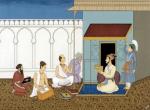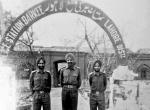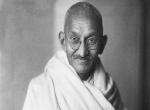The hideous massacre of unarmed Indian Satyagrahis who had gathered at Jallianwala Bagh to show their displeasure at draconian laws adopted by the British government in India is much in the news these days. The British Prime Minister’s visit and his terming the gory episode ‘shameful’ has generated debate and has again brought to the fore highly uncomfortable episodes in the British empire’s history.
It is at least good that episodes such as the cataclysmic Bengal Famine of 1943 which saw millions of Indians die and the repressive Komagata Maru incident of 1914 which saw firing by the colonial riot police on unarmed Indians is again being highlighted and vigorously discussed. After all it is only correct that in the annals of world history, the violent role of a civilisation which professed to impart modern governance structures, progressive institutions and enlightenment to much of the third world, be recorded and periodically reiterated for the benefit of posterity.
Creation of Indophobia
It is interesting to read, from colonial records, how India began to be misgoverned once the Company seriously decided to enlarge its role from that of a mere facilitator of trade to an agency for governing and enlightening the ‘natives.’ It is equally interesting to read the observations of a number of 18th and 19th century European intellectuals and India hands on how the entire societal and cultural structure of India began to be dismantled and decimated in the name of progress, modernity and European enlightenment. But such records and their authors, due to historiographical inconveniences arising out of their habit of challenging conjured notions of the superior and inferior civilisations, have been deftly and systematically ignored, marginalised and silenced.
The Indophobic mindset was carefully nurtured and allowed to triumph and the aim of the British policy that hoped to ‘minimize and denigrate the accomplishments of Indian civilisation’ 1 succeeded in creating a breed of colonial administrators whose sole purpose, while in India, was to remain aloof and give shape to the myth of an inferior Indian people and civilisation. In this, James Mill’s voluminous History of British India and in it especially his long essays of ten chapters, ‘Of the Hindus’ became the ‘single most important source of British Indophobia.’ 2 Mill’s volumes, apart from heavily influencing generations of British administrators trained to administer India, also ‘solved his financial problems.’ 3 It was a profitable business to denigrate India and Hindu civilisation regardless of whether the denigrator ever set foot in India or even knew a smattering of the natives’ language.
Reginald Dyer, the ‘Butcher of Amritsar’, his patron Michael O’Dwyer, then governor of Punjab and the majority of their ilk were representatives of that Indophobic mindset inculcated through a calibrated exposure to, among other things, Mill and his story of India. The inferiority of Indian civilisation, its thought and its achievements thus became an idée reçus for generations of youth who came over to India in order to mal-administrate her and amass a fortune in the process. Every administrative act that these Indophobics executed was inspired by that misreading of India and it was the dominance of such a mindset that eventually allowed the perpetration of some of the most violent episodes in British Indian history. Whether that mindset has altered for the better today is of course open to debate!
Challenging the Indophobic Perception of India
Alexander Walker (1764-1831), a now forgotten figure who had once served in India, took part in the operations against Hyder Ali’s forts and later became Governor General of St. Helena, had watched at close quarter Indian life and society. Walker’s perception and description of India, which did not quite fit into the colonial-evangelical scheme of denigrating her civilisation, finds no mention today in the mainstream discussion on Indian society and culture. The Indian impressions of some of his other intellectual compatriots too have suffered the same fate of an enforced silence. A product of the Edinburgh enlightenment, Walker has left behind a repository of first hand records of his sojourn in India and among them one finds an interesting description of the exact attitude and habit of the colonial administrator. Putting down his image of India sometime around 1820, Walker noted:
Europeans have formed but very inadequate and imperfect notions of the state of society and of civilisation in India. One great and the only true means of judging, they hardly or ever have enjoyed. This is the conversation and intercourse with the natives in their houses; in the midst of their families and in their private way of life. It is perhaps from the general conversation of the people and their usual domestic habits from which the best judgement can be formed of the state of their society…For want of this advantage they [Europeans] have found only bad qualities and so many of them…They have forgot also, that the manners of Europeans, and their degrading treatment of the natives, must banish from their company natives of spirit and of high pretensions….In fact it has become the interest and from thence the habit of the Company's servants to misrepresent the natives of India; to hold them forth as men who disregard every divine and human laws; who neglect the most solemn ties and obligations; who cheat and rob and are guilty of the blackest ingratitude. 4
Joining issues with Mill over his interpretation of India, especially his representation of the Hindu character, Walker unequivocally argued, that Mill’s portrayal was too ‘dark and a severe view of the Hindu character’ which ‘did not agree either with’ his [Walker’s]‘experience or observation.’ 5 In fact, he displayed remarkable prescience when he wrote to Mill, that the latter’s history of India would, if not rectified and balanced, eventually:
Add to the state of disgrace and reproach under which they [Hindus] already labour with many people; and the authority of your name will be produced to sink them still lower in the scale of society. The continual association of immorality and vice with their character will only expose them to the further contumely and contempt of our countrymen who are appointed to rule over them. 6
This was exactly the negative effect that it created in the understanding of India, not only among generations of Westerners but also among Indians themselves.
When the British talked of a being a superior civilisation, Walker argued, it was a vague idea; the scales were never effectively measured, nor were parameters developed. Interestingly, while arguing against this unfairness of approach, he made a comparison of Indian and Western civilisations at certain epochs by providing indices of comparisons. He confessed that he was quite at a loss in trying to fix the ‘point of civilisation.’ What could be the ‘discriminative characteristic of a civilised people?’ 7 How could one gloss over huge aberrations during periods which the West marked as its high points of civilisation. How could one rank in civilisational scale, Walker asked Mill, the ‘Grecians who were in the practice of murdering their prisoners, in cold blood, and who could drag them from the altar and put them, to death after a promise of mercy’, nor was ‘pre-eminence’ in science and literature a criteria for being highly civilised, or else how could one explain the fact that the age of Bacon and Newton saw many innocents being put to death for witchcraft. 8 The Indophile almost sounded like an Indian nationalist of the early part of the 20th century, when he spoke for adopting a fair yard stick in measuring civilisational heights:
The vague ideas we have of civilization must render every attempt peculiarly difficult, if not abortive, to fix the precise rank of the Hindus in the scale. In my opinion they are far above the days of Henry the 4th [1399-1413]. 9 He lived in a faithless period, which was distinguished by crimes and civil wars. Property was extremely insecure and the laws but little respected. If the state of civilization depends on commerce it had made little progress in that reign,
It was extremely rare even in the 15th century for an English vessel to appear in the Mediterranean. In the 14th century we are informed that the manners even of the Italians were rude. The cloths of the men were of leather unlined and badly tanned. We are told by a Spaniard who came to London with Philip the 2nd [1554-1598] that the English lived in houses made of sticks and dirt…Even the art of building with bricks was unknown in England until it came into general use in the time of Henry the 6th. [1422-1462]. The people were ill-lodged and not well clothed until the beginning of last century. In Scotland every thing was worse. In short the pride of Europe was quite barbarick until a very recent period and we must come down very low indeed before we can institute any comparison with Hindu manners. 10
Walker displayed a steady conviction – a result of his empirical experiences in India – regarding the high levels that Indian civilisation had reached. He saw the Hindus standing ‘pretty high in the civilisational scale’ because of their being ‘perfectly acquainted with the arts of regular life’, because of the ‘great progress’ of science amongst them, because of their respect for and adherence to ‘moral values’ and more importantly, because they have never ‘disgraced themselves neither by sanguinary punishments nor by senseless prosecutions against those who entertain’ singularly opposite opinions. 11 The last was a most important criterion for civilisation in which Europe had repeatedly failed the test. Walker’s persistence, his first hand experience of India, made Mill eventually accept the errors of his own judgment of Hindu civilisation, he replied, ‘Above all you have convinced me that I had drawn the moral character of the Hindus in too dark colours, and this I shall acknowledge.’ 12 But intriguingly the copies of his volumes were never withdrawn neither were substantial alterations made to ward off the negative effects of that reading. Mill was treated as an authority on India and his descendants never ceased to promote his line. The alternate narrative of India was throttled by the dominant Indophobic mindset.
The Spectre Still Looms
Like his other colleagues of the Edinburgh enlightenment, Alexander Walker displayed a great concern for the adverse effects of British modernity on India, her people and society. He was worried that the ‘conquest and defeat of a civilisation generally led not only to its disintegration’ but to the loss of its precious knowledge, styles of living and identity altogether. 13 He and some others appeared to be convinced that the official British policy in India was working towards facilitating just such a demise of the Indic civilisation by nurturing the growth, consolidation and dominance of the Indophobic mindset, a mindset which would ultimately outlast the empire itself. The resistance to the creation of such a mindset never took off; it remained at best peripheral by refusing to serve the aims of political subjugation and dominance.
Dyer’s act was just one of those bloody manifestations of that mindset; he was an administrative mercenary while Mill was an intellectual mercenary with both working to disintegrate a civilisation superior to their own. It is the same mindset which made Philip Duke of Edinburgh find the figures of those killed at Jallianwala Bagh ‘a bit exaggerated’ and it’s the same mindset which refuses to tender unqualified apologies for historical wrongs, denies the famine holocaust in Bengal, overlooks the creation of the political mess in the subcontinent and refuses to entertain any serious debate on treasures forcibly taken and their possible return to their country of origin.
The spectre of Indophobia thus still looms large and resistance to it is at best marginal!
Endnotes
- Thomas R. Trautmann, Aryans and British India, (Berkeley: University of California Press, 1997), p.113.
- Ibid., p.117.
- Ibid., p.118.
- ‘Alexander’s Walker’s Image of India’ (Edinburgh: National Library of Scotland: Walker Bowland Papers) in Dharampal, ‘British Narrations on India, Its Conquest, Dominance and Destruction 1600-1900’, Archival Compilation, vol.9, (Sevagram: Ashram Pratishtan, 2000), p.88.
- Alexander Walker’s letter to James Mill dated 24th November, 1819, in ibid., p.75.
- Ibid.
- Alexander Walker’s letter to James Mill, dated 21st October, 1819, ibid., pp.73-74.
- Ibid., p.73.
- Indicates the period of reign.
- Letter dated 24th November 1819, op.cit., p.76.
- Letter dated 21st October 1819, op.cit., p.74.
- James Mill letter dated, February 26th , 1820, p.77.
- See e.g. Dharampal, The Beautiful Tree, (Mapusa: Other India Press, 2000), pp.15-16.
Published Date: 26th February 2013, Photo courtesy: British Library Online Gallery










Post new comment